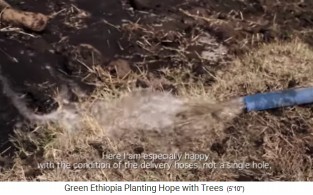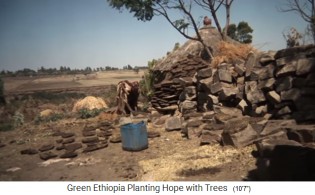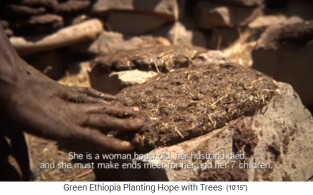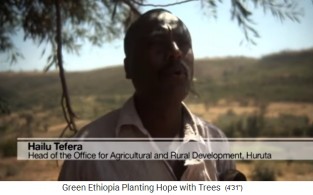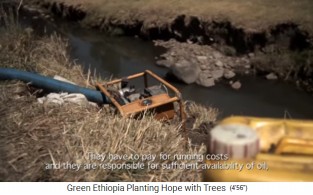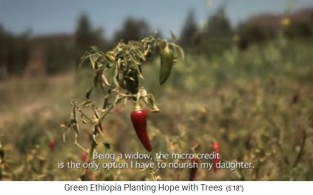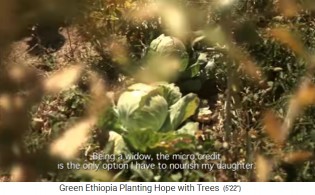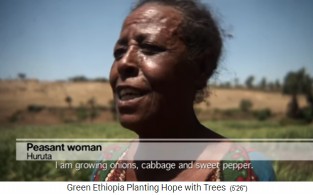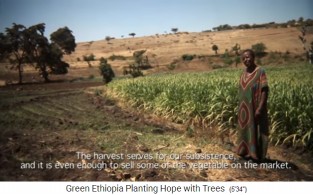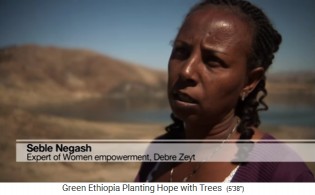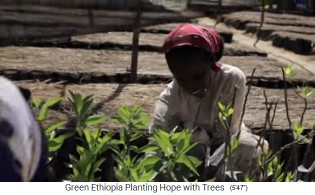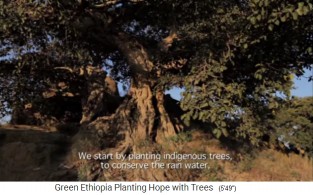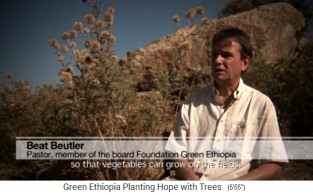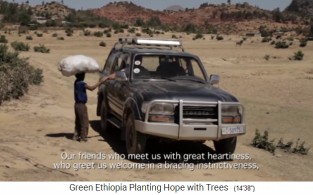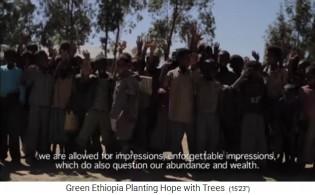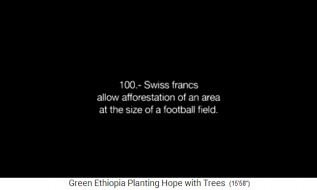Nordland Film
roja-media Productions presents: Green Ethopia.
Planting Hope with Trees (18''). Music: Fredrik
Strömberg & H2U - Voice: Marcus Signer (28'').
Camera&Director: Luki Frieden / Jan Mühlethaler
(30'').
1. Malnutrition in Ethiopia due to
destroyed forests
Speaker: Ethiopia with 90 million inhabitants is one
of the poorest countries in the world, about 50% are
malnourished (45''). The reason is hunger due to
drought [in the dry season] and continuous damage due
to flooding [in the rainy season]. All forests were
cut down and erosion destroyed the humus layer (58'').
Kurt Pfister is the founder and president of the Green
Ethiopia Foundation (1'7'').
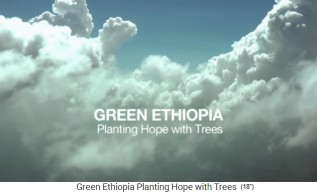
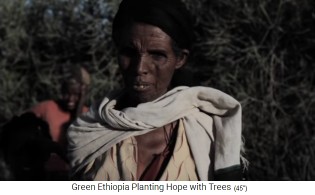
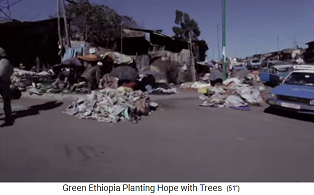 Film title "Green Ethiopia. Planting
hope with trees" - Malnutrition in Ethiopia -
Ethiopia, slums with garbage heaps
Film title "Green Ethiopia. Planting
hope with trees" - Malnutrition in Ethiopia -
Ethiopia, slums with garbage heaps
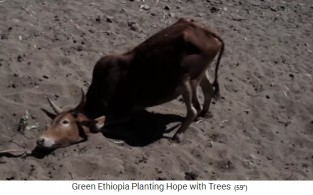
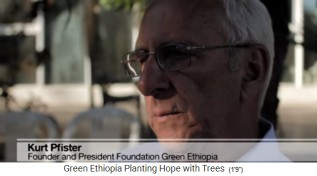
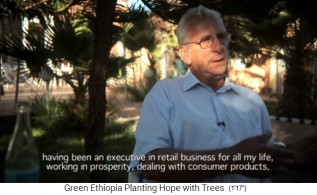
Ethiopia, cow scratching itself in
the desert - Mr. Kurt Pfister, founder of the
foundation "Green Ethiopia" 1,2
Kurt Pfister: First he worked as a management
assistant for the Migros warehouse in Switzerland, and
now he's getting something going in a poor country.
Some people don't really want believe in his
commitment because they claim that the contrast would
be too great (1'22''). In Migros' management training,
"Serving people" was taught, and he now continues this
in Ethiopia now after his retirement in Ethiopia
(1'38'').
2. Planting forest step 1: The tree nursery in the
village
Speaker: 100 years ago [in about 1914] 40% of Ethiopia
were still forested (1'52''). Today [approx. 2014]
only 3% has left as forest (1'57''). First, tree
nurseries are established in villages, and the
inhabitants are trained in cooperation with ecological
authorities how to grow native trees as seedlings
(2'16''). In this way the population learns how to
breed seedlings and how to make them grow (2'26'').
For example, 100,000 tree seedlings are bred per year
in a tree nursery with compost soil (2'32'').
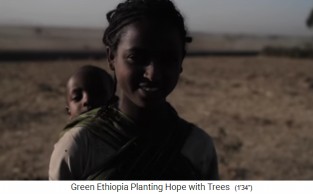
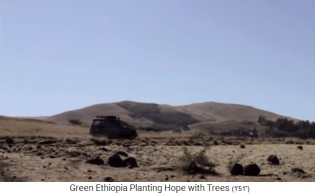
 Äthiopien, Mutter mit Kind auf dem
Rücken - Äthiopien, ein Berg mit einem
Wiederaufforstungsgebiet - Baumschule 01: Es wird
ein Gebiet abgesteckt
Äthiopien, Mutter mit Kind auf dem
Rücken - Äthiopien, ein Berg mit einem
Wiederaufforstungsgebiet - Baumschule 01: Es wird
ein Gebiet abgesteckt
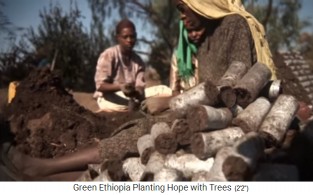
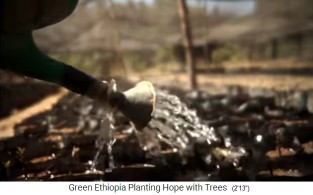
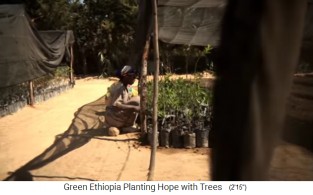
Tree nursery 02: Compost soil is formed into rolls -
tree nursery 03: Saplings are watered with water -
tree nursery 04: Small trees with a plastic around
them
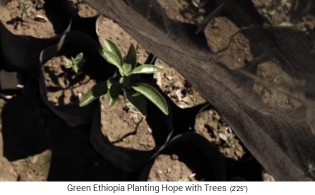
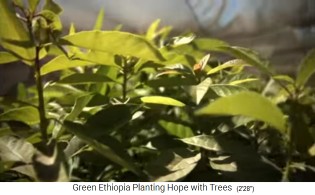
Tree nursery 05: A seedling is sprouting - tree
nursery 06: Sprouted seedlings
2. Planting forest step 2: plant the trees
Holes are hacked into the desert and the seedlings are
put with the compost soil, then the hole is well
sealed with the surrounding soil (2'36''). Every year
4 million trees are planted in Ethiopia, so that
forests grow again and springs bubble up from the
ground (2'42'').
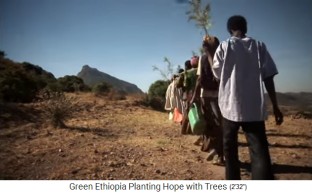
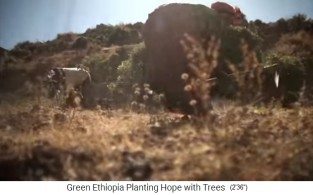
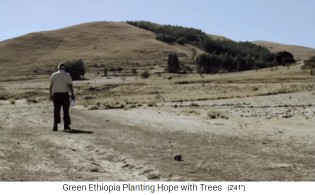
Ethiopia Foundation "Green Ethiopia": A group starts
planting large tree seedlings to expand the forest -
planting forest: A group is hacking holes in the
hard desert soil - The forest of Boreta Gerado
Dengego 01, the mountain is partly wooded.
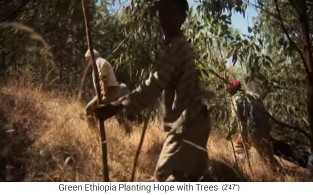
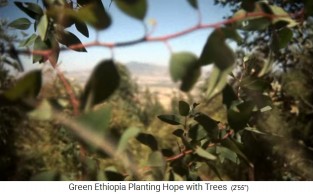
The forest of Boreta Gerado Dengego 02, a group in
the forest - The forest of Boreta Gerado Dengego 03
2. Planting forest step 3: New forests produce
new creeks, so that controlled irrigation farming
becomes possible ALL YEAR LONG
Let's see an example, the farmers' cooperative
Boreta-Gerado-Dengego: Mr. Kurt Pfister is telling: 7
years ago there was only eroded land here, without a
single tree, with floods during the rainy season
(3'12''). The floods have repeatedly destroyed the
valuable cultivated land (3'15''). The farmers have to
do the reforestation work on the mountains themselves,
so they learn to appreciate the forest (3'30''). The
farmers become proud when they see that their planted
trees become a forest, then they don't destroy the
forest any more, but take care of it (3'44'').
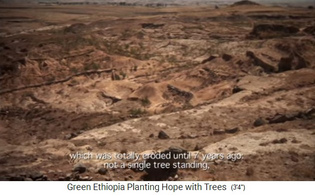
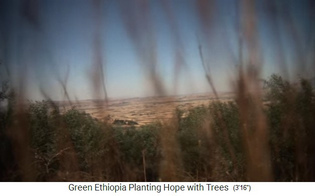
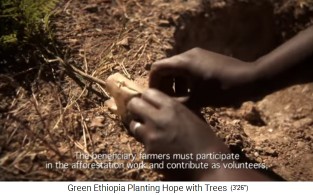 In 2005 the
area of Boreta Gerado Dengego was still
bare and eroded - The cultivated land of
Boreta Gerado Dengego - Planting trees 01:
Remove the plastic shell around the earth
In 2005 the
area of Boreta Gerado Dengego was still
bare and eroded - The cultivated land of
Boreta Gerado Dengego - Planting trees 01:
Remove the plastic shell around the earth

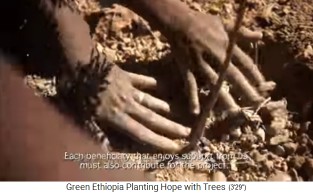
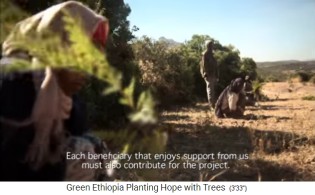
Planting trees 02: The seedling, which is
a small tree now, is placed in a tree hole
- Planting trees 03: The tree hole with
the small tree is closed with surrounding
soil - Planting trees 04: The group plants
the trees in a row
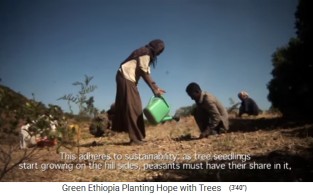
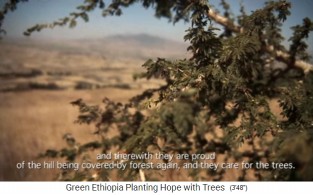
Tree care 01, daily watering - The
forest of Boreta Gerado Dengego 04
Speaker: In the
rainy season, the forest is acting like a "sponge", is
absorbing water, protects the region from flooding in
the lowlands, and is releasing water with a few
springs that are bubbling all year round (4'1''). In
this way, fields can be irrigated during the dry
season so that the population's diet is no longer a
problem (4'11''). The farmers are producing so much
that they can sell vegetables and fruits on the local
market (4'18'').
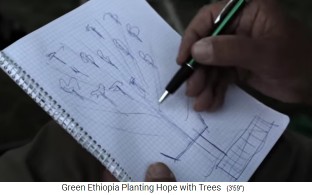

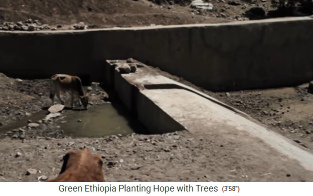 Plan: The forest has a sponge
effect, stores the rainwater and provokes a spring
with a watercourse - which is dammed with a barrage
- The barrage at low tide, so that you can see the
barrage
Plan: The forest has a sponge
effect, stores the rainwater and provokes a spring
with a watercourse - which is dammed with a barrage
- The barrage at low tide, so that you can see the
barrage
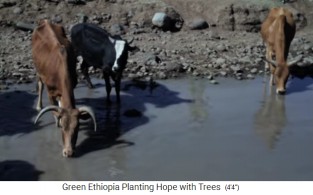
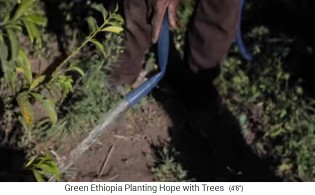
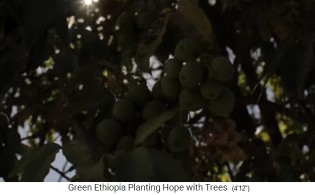 The waterhole for the cows -
irrigation from the stream - tree with fruits
The waterhole for the cows -
irrigation from the stream - tree with fruits
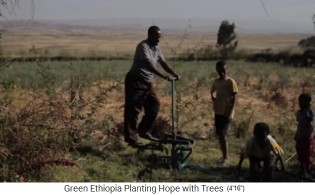
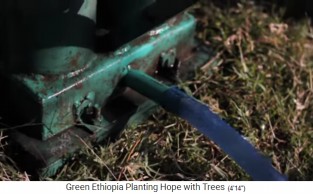
Water pump as foot pump - The water
hose of the pedal water pump
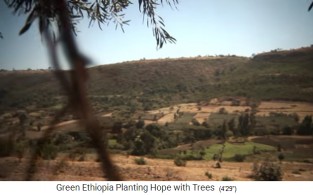
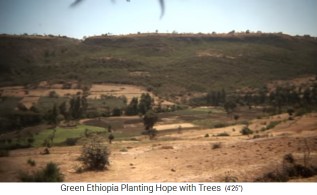
Mountain slope
with forest 1,2
Mr.
Hailu Tefera is the President of the Office for
Agricultural Rural Development in Huruta. He tells:
Previously everything was yellow here and the land
was bare because there was no water. The cattle
always had to be led to water holes, that is no
longer the case today, the water comes to the farms
(4'36'').
Mr. Hailu Tefera from Huruta - A
water pump with petrol engine at the creek - The
water reaches the field
Mr. Pfister tells: The water pump brings the water
to the farms. 10 to 14 farmers jointly manage a
water pump (4'48''). The farmers have to do the
maintenance (4'56''). With the profit of the sale of
vegetables and fruits on the market, the farmers can
easily maintain this water pump (5'5''). [When there
would be a canal system also the water pumps would
not be necessary].
Chili grows in a
field - Cabbage grows in a field - A farmer's wife
tells of onions, pumpkins and pepperoni
Farmer's wife from Huruta: The microcredit is my only
chance for me and my daughter. On my fields are growing
onions, pumpkins and pepperoni (5'24''). The harvest
gives us food, and we can even sell a part of it on the
market (5'28'').
Seble Negash from the women's group Debre Zeyt: The
farmers see themselves: When there is care for the
mountain, everything will change (5'37''). The people
know what they owe to the Green Ethiopia Foundation
(5'43''). Especially the women know this (5'47'').
A farmer's wife in
front of a cultivated field - Neble Negash by Debre
Zeyt - Children are playing "irrigation"
Supervisory board member Mr. Beat Beutler says: First
trees are planted to store the water, then springs are
created so that the vegetable fields can be cultivated
[all year round] (5'55''). In this way people find a
more humane life (6'3''). This also makes food more
varied (6'7'').
A woman cares for
tree seedlings - An old carob tree in Ethiopia - Mr.
Beat Beutler
Mr. Simon Pfister is the CEO of the Green Ethiopia
Foundation: Together with the forest, the water supply
was installed (6'12''). The quality of the vegetable
fields and the water was also ensured, as was the water
quality of the lake (6'20'').
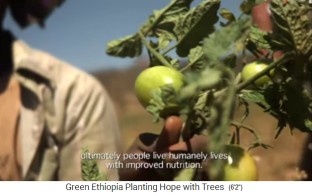
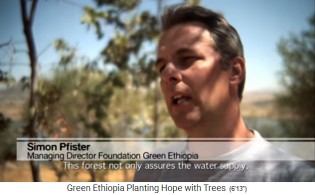
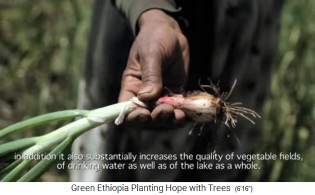 Unripe tomatoes on a field of the
Foundation Green Ethiopia - Mr. Simon Pfister - Leek
from a field of the Foundation Green Ethiopia
Unripe tomatoes on a field of the
Foundation Green Ethiopia - Mr. Simon Pfister - Leek
from a field of the Foundation Green Ethiopia
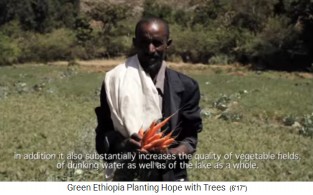
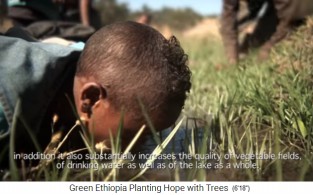
Carrots from a
field of the Green Ethiopia Foundation - Children
drink the fresh irrigation water from the ground
Speaker: Mr. Kurt Pfister is well known in the region
and is always welcome, no matter where he goes (6'42'').
The farmers call him simply "Mr. Kutu", a fair partner
and friend (6'54''). Some of the projects are many hours
away by car (8'7'').
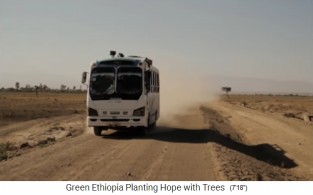
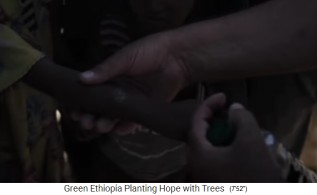
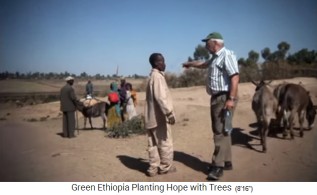
Bus trip in Ethiopia on a dusty country road (7'18'')
- Ethiopia is 3 times as big as Germany (10'55'') - A
boy has a burning on his forearm - Mr. Kurt Pfister
gives instructions not to hit the donkey
3. Farmers and woman farmers in Ethiopia cripple by
transports because vehicles are missing - distributing
donkeys for load transports
Mr. Boss Kurt Pfister indicates: The rural population of
Ethiopia is still hardly motorised. Women have to carry
heavy loads for kilometres, so that some of them cripple
(9'7''). Green Ethiopia Foundation has a project to
distribute donkeys to women (9'22''). The communities
themselves decide who should receive a donkey, so there
are no conflicts later (9'40'').
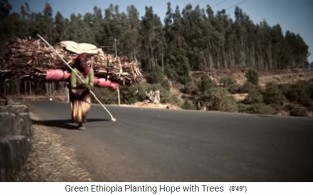
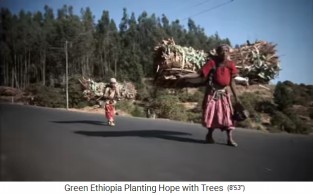
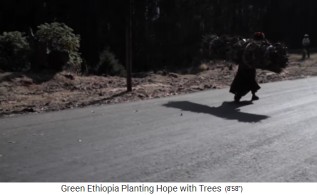 Women carry firewood approx. 30kg
on their back 1,2,3
Women carry firewood approx. 30kg
on their back 1,2,3
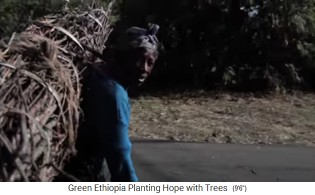
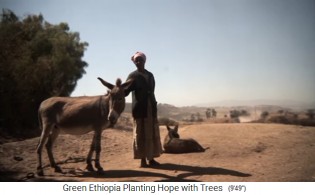
 Women carry
firewood approx. 30kg on their back 04 with
visible neck suspension - A woman is given a
donkey - A woman from Lote Hetosa with a donkey:
Thanks to the donkey her children can now attend
school
Women carry
firewood approx. 30kg on their back 04 with
visible neck suspension - A woman is given a
donkey - A woman from Lote Hetosa with a donkey:
Thanks to the donkey her children can now attend
school
A
donkey costs 120 "US"-dollars and can change the
life of a woman totally positive (9'53''). Farmer's
wife Lote Hetosa tells: Thanks to the donkey, my
children can now attend school (10'1''). Speaker:
120 dollars is an annual income in Ethiopia
(10'9'').
Head Kurt Pfister: The farmer's wife has 7 children
and her husband died, so she got the donkey as a
present (10'19''). The farmer's wife dries the
donkey dung and uses it as a fuel for cooking, and
also sells some of it to have further income
(10'29'').
4. Also children in Ethiopia also have to carry
heavy loads in the country because of lack of vehicles
Speaker: Mr. Kurt Pfister travels 3 to 4 times a year to
Ethiopia for several weeks. Ethiopia is 3 times as big as
Germany (10'55'').
Supervisory Board member Mr. Beat Beutler: He sees mankind
as a "family" at a large table, and we do not accept
hunger: "It cannot be that some people sit in front of
full plates, while others see only empty plates in front
of them." (11'32''). Film: Already children are accustomed
to carrying big bags with heavy loads (11'32'').
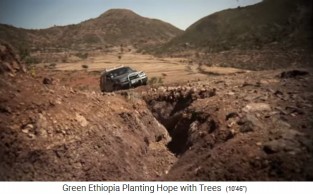
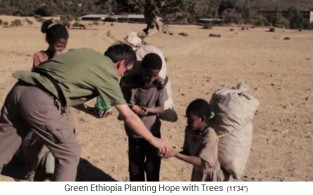
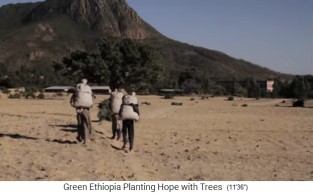
Some country lanes are only passable with a 4x4 -
even children in Ethiopia in the countryside have to
carry big loads, with neck suspension 1,2
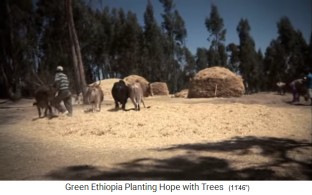
Grain is threshed with cows
5. The education of the
schoolchildren: every child cultivates his school tree
- a fruit tree for harvesting
Speaker: In this way the complete natural production
cycle is reinstalled (11'40''). It started in the year
of 2000 as a family business and became a family project
with heart (11'45''). Co-founder Mrs. Irene
Pfister-Hauri: This project Ethiopia is like our third
child (11'57''). Film: And many mountains are still bare
(12'8'').
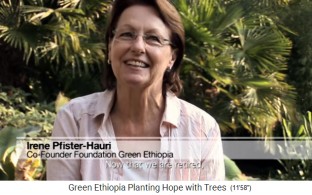 Irene Pfister-Hauri, co-founder of
Green Ethiopia
Irene Pfister-Hauri, co-founder of
Green Ethiopia
Mrs. Pfister-Hauri: There are many children in Ethiopia
who have never seen a fruit before. This is why they are
motivated to plant trees and harvest fruit from their
own work (12'42'').
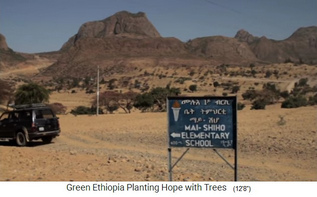

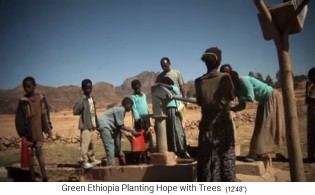
The sign of
the primary school Mai Shiho - Mr. Kurt Pfister,
arrival at a school - school children get water
with watering cans from a hand pump
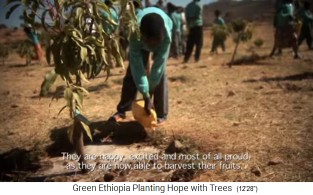

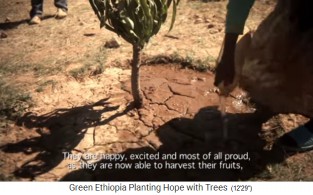
A boy pupil is watering his tree - A girl pupil is
watering her tree 1,2
Speaker: Pfisters Foundation has
introduced the pupil tree: Every schoolchild plants a
fruit tree on the floor of the school and has to take
care of it every day (12'50''). In this way, the life
cycle of the young generation is taught with trees:
Trees - Water - Food (13'4''). Pfister simply supports
people who would otherwise not receive any help
(13'42'').

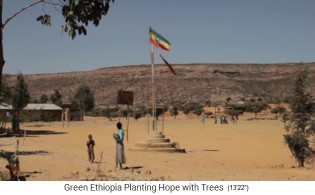
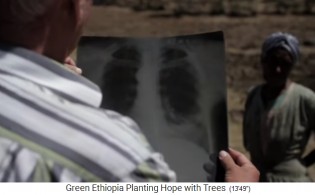
A school class of the primary school Mai Shiho in
Ethiopia - In the schoolyard of the school Mai Shiho
two flags are waving - Mr. Kurt Pfister checks an
X-ray photo of a lung
Mr. Pfister sometimes also pays
medicines to sick people who have no money (13'52'').
Pfister: It's a drop on a hot stone, but where the drop
falls it has a positive and healing effect (14'20'').
The positive feedback always gives new strength to
continue (14'51'').
Mr. Beat Beutler, member of the supervisory board: When
you see here how happy people are with forests and
irrigation, you ask yourself how development aid should
generally go (15'31'').
A child carries a
big bag on his head because vehicles are missing -
schoolchildren saluting
Text board: 100 Swiss francs allow the afforestation of
an area as large as a football field (15'59'').
|
|
Donation
account
Green Ethiopia
Migros Bank, CH-8010 Zurich, Switzerland
IBAN: CH22 0840 1016 8031 8430 6
Account Number: 16 8031 8430 6
Clearing Nummer: 8401
SWIFT Code: MIGRCHZZ80A
|
Text board: 100 Swiss francs
allow an area as large as a football pitch to
be reforested - The Green Ethiopia
Foundation's donation account
|
Text board: This film was made possible
by: Protestant Church Thun-Strättlingen, AEK BAnk 1826,
Wistar Informatik, Helen Kirchhofer watches+jewelry,
Ricola Switzerland, Frutiger
Switzerland, Inoptima SSwitzerlandchweiz,
Sommerhalten Graphics Switzerland,
private donors (16'32'').
Text board: Concept+director: Luki Frieden, Jan
Mühlethaler - Camera: Jan Mühlethaler, Luki Frieden -
Interviews: Luki Frieden - Editor: Jan Mühlethaler -
Text: Luki Frieden - Voice: Marcus Signer - Music mix:
Peter von Siebenthal - Music: Fredrik Stömberg&H2U -
Takla Maklan by YELLO feat: Dorothee Oberlinger - Chu
Chuh: Ethiopian folk song (16'40'').
Text board: Contributors in Ethiopia: Head of
agricultural development projects, foresters of
reforestation projects, farmers of farmers'
organisations in Tigray and Oromia, pupils of different
schools of Adwa Woreda, farmers of Huruta Woreda, women
from Addis Abbeba with firewood on their back (16'55'').
Text board: Special thanks for support: to Pastor Beat
Beutler, Thun, to members of the Green Ethiopia
Foundation - partner organisations: Yves Rocher
Foundation, France - Fontana Foundation, Herrliberg,
Switzerland, Cinegrell camera rental - and all donors
who make life better (17'9'').
Text board with logo: donation
account
Green
Ethiopia
Migros Bank, CH-8010 Zurich, Switzerland
IBAN: CH22 0840 1016 8031 8430 6
Account Number: 16 8031 8430 6
Clearing Nummer: 8401
SWIFT Code: MIGRCHZZ80A









